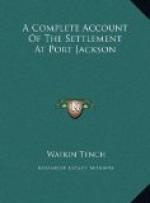On the following day (November 11th) the ‘Mary Anne’, Captain Munro, another of the whalers, returned into port, after having been out sixteen days. She had gone as far south as 41 degrees but saw not a whale, and had met with tremendously bad weather, in which she had shipped a sea that had set her boiling coppers afloat and had nearly carried them overboard.
November 22d. The ‘William and Anne’, Captain Buncker, returned after having been more than three weeks out, and putting into Broken Bay. This is the ship that had killed the fish in which Melville shared. Buncker had met with no farther success, owing, he said, entirely, to gales of wind; for he had seen several immense shoals and was of opinion that he should have secured fifty tons of oil, had the weather been tolerably moderate. I asked him whether he thought the whales he had seen were fish of passage. “No,” he answered, “they were going on every point of the compass, and were evidently on feeding ground, which I saw no reason to doubt that they frequent.” Melville afterwards confirmed to me this observation. December 3rd, the ‘Mary Anne’ and ‘Matilda’ again returned. The former had gone to the southward, and off Port Jervis had fallen in with two shoals of whales, nine of which were killed, but owing to bad weather, part of five only were got on board. As much, the master computed, as would yield thirty barrels of oil. He said the whales were the least shy of any he had ever seen, “not having been cut up”. The latter had gone to the northward, and had seen no whales but a few fin-backs.
On the 5th of December, both these ships sailed again; and on the 16th and 17th of the month (just before the author sailed for England) they and the ‘Britannia’ and ‘William and Anne’ returned to Port Jackson without success having experienced a continuation of the bad weather and seen very few fish. They all said that their intention was to give the coast one more trial, and if it miscarried to quit it and steer to the northward in search of less tempestuous seas.




